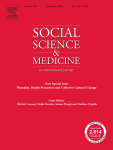Childhood vaccination resistance has given rise to outbreaks of diseases, which had been virtually eliminated in the developed world. A parent's decision to forego vaccination for their child is a private choice that can have collective outcomes. This article takes a two-pronged approach to unraveling the puzzle of perceiving vaccines as dangerous in view of evidence that testifies to their effectiveness and relative safety. First, it draws on fifty-seven years of newspaper articles on vaccines to outline the public narratives. Second, it uses school-level data from New York and California to explore how these public narratives shape a geography of vaccination rates. We have two main findings. First, we find that while risk has always been a feature of vaccine narratives, the perception that the risks of vaccines out-weigh the benefits has grown. By the millennium, some began to view medical treatments as sources of risk rather than cure. Second, our geography of childhood vaccination reveals two distinct vaccine worlds. Affluence governs one world. Poverty governs the other. The geographic locales where vaccination rates are low enable us to contrast the difference between imagining risk, the prerogative of the affluent, and being at risk, the fate of the poor. Vaccination resistance speaks directly to a Culture of Health as it poses questions about the collective perception of risk and its relation to social inequality and solidarity.
Publication Type
- Article



